Unit 503: Professional Practice & Development in Education Report
VerifiedAdded on 2023/06/09
|13
|3916
|371
Report
AI Summary
This report delves into wider professional practice and development within education and training, focusing on the concept of professionalism, the influence of professional values, and the impact of educational policies. It analyzes factors influencing educational policy in the UK, including social, political, and economic elements, and examines the roles and accountabilities of stakeholders and external bodies such as Ofsted. The report also covers organizational policies, codes of practice, and guidelines, emphasizing quality assurance and improvement processes. It further discusses self-assessment and evaluation within the quality cycle, aiming to identify areas for improvement in learning programs to enhance organizational effectiveness, highlighting the importance of partnership working and stakeholder engagement in curriculum design and delivery.
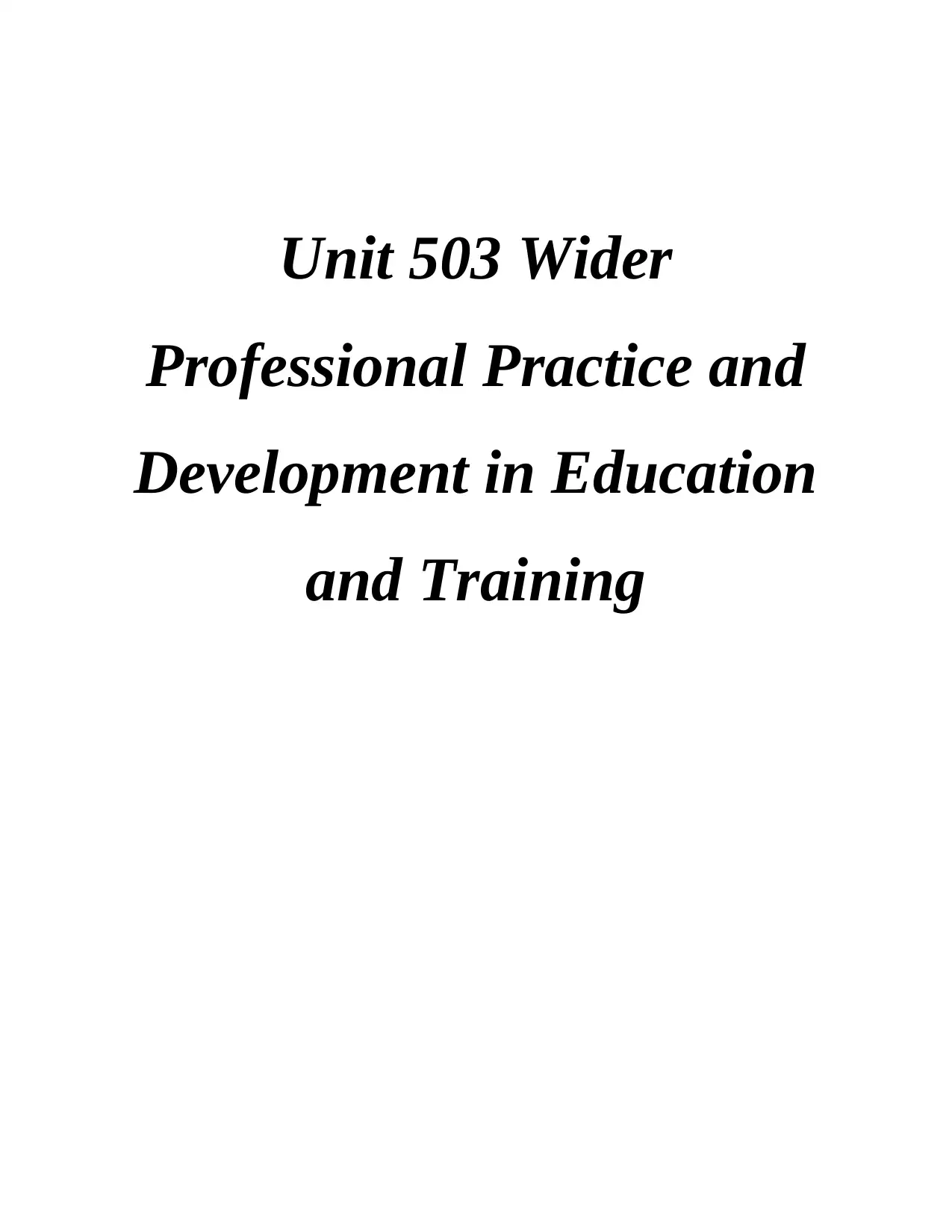
Unit 503 Wider
Professional Practice and
Development in Education
and Training
Professional Practice and
Development in Education
and Training
Paraphrase This Document
Need a fresh take? Get an instant paraphrase of this document with our AI Paraphraser
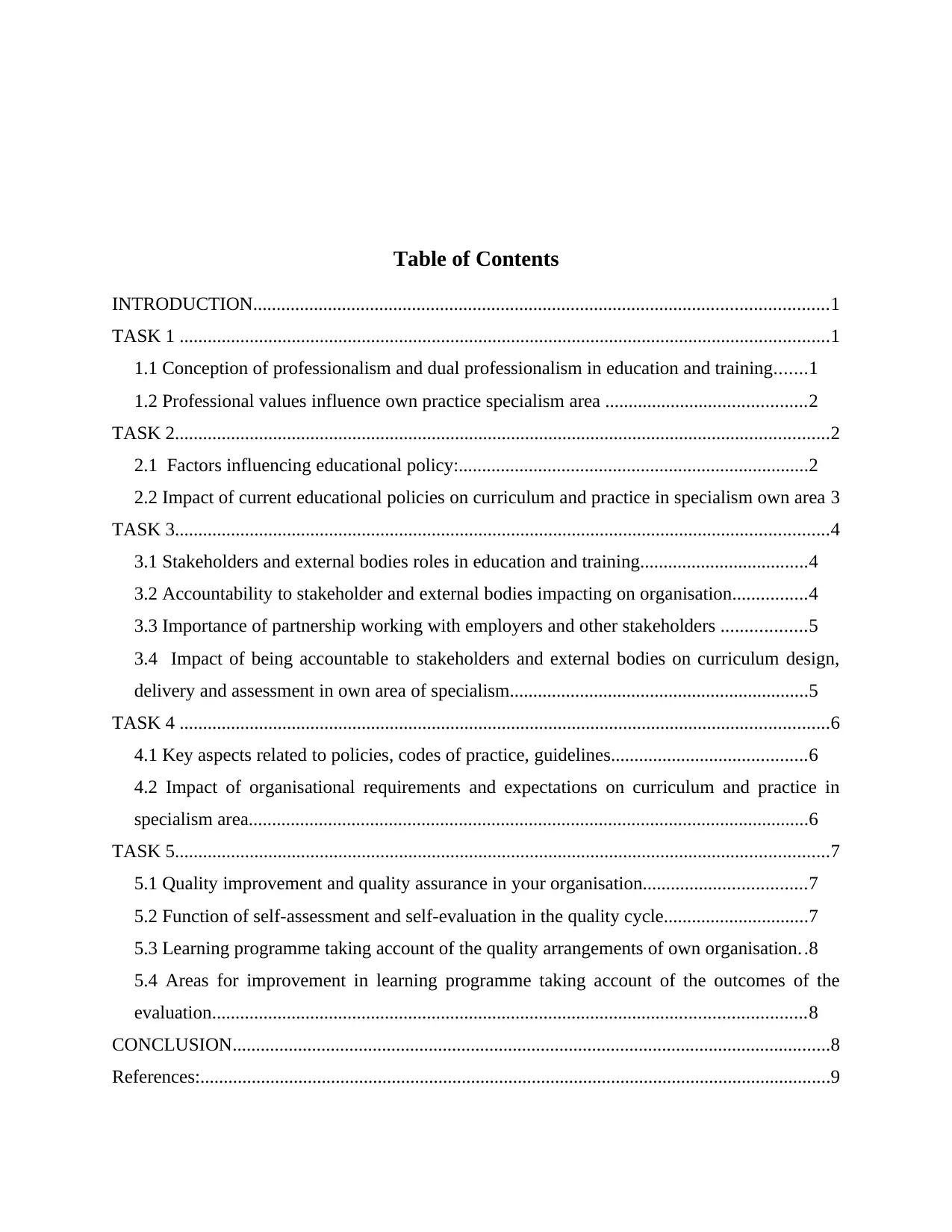
Table of Contents
INTRODUCTION...........................................................................................................................1
TASK 1 ...........................................................................................................................................1
1.1 Conception of professionalism and dual professionalism in education and training.......1
1.2 Professional values influence own practice specialism area ...........................................2
TASK 2............................................................................................................................................2
2.1 Factors influencing educational policy:...........................................................................2
2.2 Impact of current educational policies on curriculum and practice in specialism own area 3
TASK 3............................................................................................................................................4
3.1 Stakeholders and external bodies roles in education and training....................................4
3.2 Accountability to stakeholder and external bodies impacting on organisation................4
3.3 Importance of partnership working with employers and other stakeholders ..................5
3.4 Impact of being accountable to stakeholders and external bodies on curriculum design,
delivery and assessment in own area of specialism................................................................5
TASK 4 ...........................................................................................................................................6
4.1 Key aspects related to policies, codes of practice, guidelines..........................................6
4.2 Impact of organisational requirements and expectations on curriculum and practice in
specialism area........................................................................................................................6
TASK 5............................................................................................................................................7
5.1 Quality improvement and quality assurance in your organisation...................................7
5.2 Function of self-assessment and self-evaluation in the quality cycle...............................7
5.3 Learning programme taking account of the quality arrangements of own organisation..8
5.4 Areas for improvement in learning programme taking account of the outcomes of the
evaluation...............................................................................................................................8
CONCLUSION................................................................................................................................8
References:.......................................................................................................................................9
INTRODUCTION...........................................................................................................................1
TASK 1 ...........................................................................................................................................1
1.1 Conception of professionalism and dual professionalism in education and training.......1
1.2 Professional values influence own practice specialism area ...........................................2
TASK 2............................................................................................................................................2
2.1 Factors influencing educational policy:...........................................................................2
2.2 Impact of current educational policies on curriculum and practice in specialism own area 3
TASK 3............................................................................................................................................4
3.1 Stakeholders and external bodies roles in education and training....................................4
3.2 Accountability to stakeholder and external bodies impacting on organisation................4
3.3 Importance of partnership working with employers and other stakeholders ..................5
3.4 Impact of being accountable to stakeholders and external bodies on curriculum design,
delivery and assessment in own area of specialism................................................................5
TASK 4 ...........................................................................................................................................6
4.1 Key aspects related to policies, codes of practice, guidelines..........................................6
4.2 Impact of organisational requirements and expectations on curriculum and practice in
specialism area........................................................................................................................6
TASK 5............................................................................................................................................7
5.1 Quality improvement and quality assurance in your organisation...................................7
5.2 Function of self-assessment and self-evaluation in the quality cycle...............................7
5.3 Learning programme taking account of the quality arrangements of own organisation..8
5.4 Areas for improvement in learning programme taking account of the outcomes of the
evaluation...............................................................................................................................8
CONCLUSION................................................................................................................................8
References:.......................................................................................................................................9

⊘ This is a preview!⊘
Do you want full access?
Subscribe today to unlock all pages.

Trusted by 1+ million students worldwide
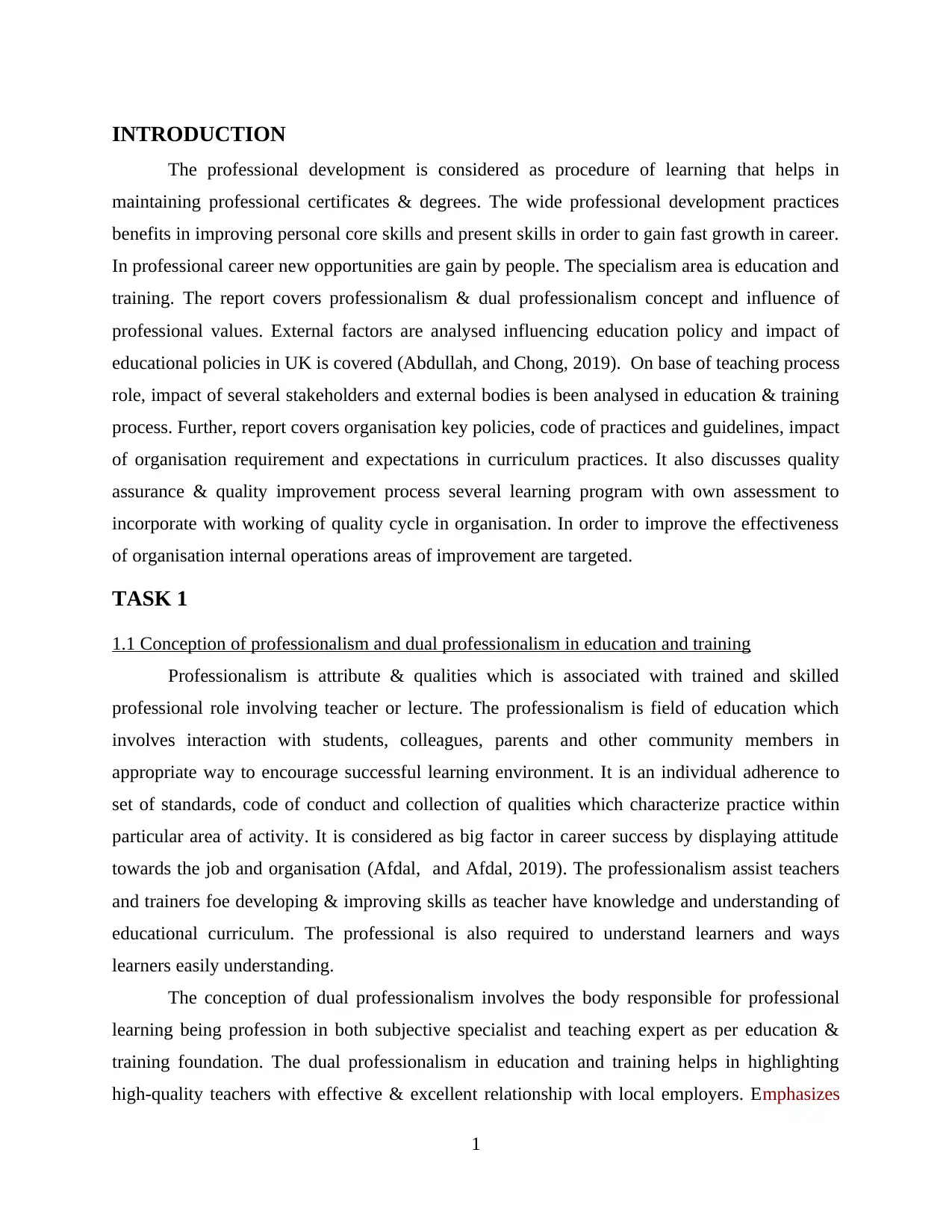
INTRODUCTION
The professional development is considered as procedure of learning that helps in
maintaining professional certificates & degrees. The wide professional development practices
benefits in improving personal core skills and present skills in order to gain fast growth in career.
In professional career new opportunities are gain by people. The specialism area is education and
training. The report covers professionalism & dual professionalism concept and influence of
professional values. External factors are analysed influencing education policy and impact of
educational policies in UK is covered (Abdullah, and Chong, 2019). On base of teaching process
role, impact of several stakeholders and external bodies is been analysed in education & training
process. Further, report covers organisation key policies, code of practices and guidelines, impact
of organisation requirement and expectations in curriculum practices. It also discusses quality
assurance & quality improvement process several learning program with own assessment to
incorporate with working of quality cycle in organisation. In order to improve the effectiveness
of organisation internal operations areas of improvement are targeted.
TASK 1
1.1 Conception of professionalism and dual professionalism in education and training
Professionalism is attribute & qualities which is associated with trained and skilled
professional role involving teacher or lecture. The professionalism is field of education which
involves interaction with students, colleagues, parents and other community members in
appropriate way to encourage successful learning environment. It is an individual adherence to
set of standards, code of conduct and collection of qualities which characterize practice within
particular area of activity. It is considered as big factor in career success by displaying attitude
towards the job and organisation (Afdal, and Afdal, 2019). The professionalism assist teachers
and trainers foe developing & improving skills as teacher have knowledge and understanding of
educational curriculum. The professional is also required to understand learners and ways
learners easily understanding.
The conception of dual professionalism involves the body responsible for professional
learning being profession in both subjective specialist and teaching expert as per education &
training foundation. The dual professionalism in education and training helps in highlighting
high-quality teachers with effective & excellent relationship with local employers. Emphasizes
1
The professional development is considered as procedure of learning that helps in
maintaining professional certificates & degrees. The wide professional development practices
benefits in improving personal core skills and present skills in order to gain fast growth in career.
In professional career new opportunities are gain by people. The specialism area is education and
training. The report covers professionalism & dual professionalism concept and influence of
professional values. External factors are analysed influencing education policy and impact of
educational policies in UK is covered (Abdullah, and Chong, 2019). On base of teaching process
role, impact of several stakeholders and external bodies is been analysed in education & training
process. Further, report covers organisation key policies, code of practices and guidelines, impact
of organisation requirement and expectations in curriculum practices. It also discusses quality
assurance & quality improvement process several learning program with own assessment to
incorporate with working of quality cycle in organisation. In order to improve the effectiveness
of organisation internal operations areas of improvement are targeted.
TASK 1
1.1 Conception of professionalism and dual professionalism in education and training
Professionalism is attribute & qualities which is associated with trained and skilled
professional role involving teacher or lecture. The professionalism is field of education which
involves interaction with students, colleagues, parents and other community members in
appropriate way to encourage successful learning environment. It is an individual adherence to
set of standards, code of conduct and collection of qualities which characterize practice within
particular area of activity. It is considered as big factor in career success by displaying attitude
towards the job and organisation (Afdal, and Afdal, 2019). The professionalism assist teachers
and trainers foe developing & improving skills as teacher have knowledge and understanding of
educational curriculum. The professional is also required to understand learners and ways
learners easily understanding.
The conception of dual professionalism involves the body responsible for professional
learning being profession in both subjective specialist and teaching expert as per education &
training foundation. The dual professionalism in education and training helps in highlighting
high-quality teachers with effective & excellent relationship with local employers. Emphasizes
1
Paraphrase This Document
Need a fresh take? Get an instant paraphrase of this document with our AI Paraphraser
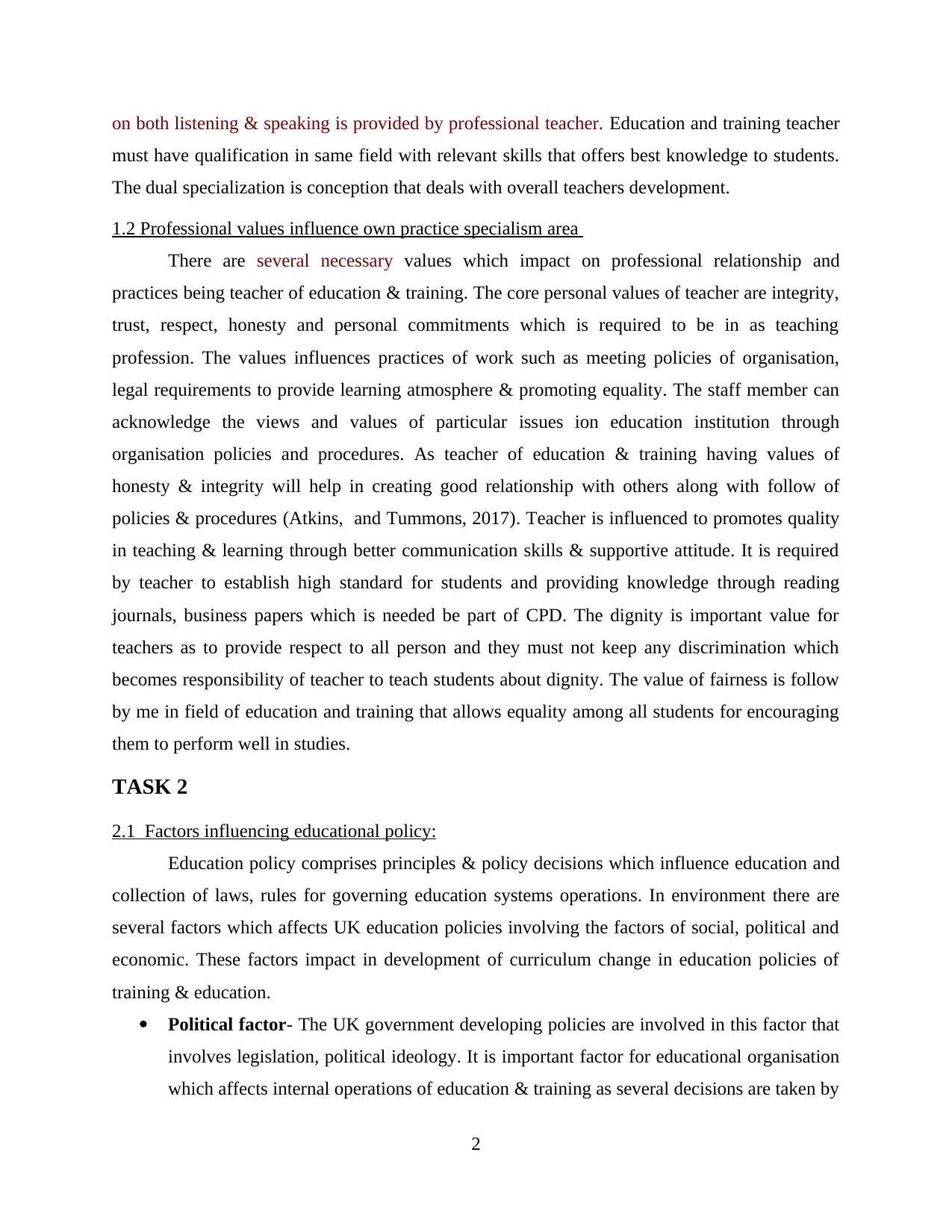
on both listening & speaking is provided by professional teacher. Education and training teacher
must have qualification in same field with relevant skills that offers best knowledge to students.
The dual specialization is conception that deals with overall teachers development.
1.2 Professional values influence own practice specialism area
There are several necessary values which impact on professional relationship and
practices being teacher of education & training. The core personal values of teacher are integrity,
trust, respect, honesty and personal commitments which is required to be in as teaching
profession. The values influences practices of work such as meeting policies of organisation,
legal requirements to provide learning atmosphere & promoting equality. The staff member can
acknowledge the views and values of particular issues ion education institution through
organisation policies and procedures. As teacher of education & training having values of
honesty & integrity will help in creating good relationship with others along with follow of
policies & procedures (Atkins, and Tummons, 2017). Teacher is influenced to promotes quality
in teaching & learning through better communication skills & supportive attitude. It is required
by teacher to establish high standard for students and providing knowledge through reading
journals, business papers which is needed be part of CPD. The dignity is important value for
teachers as to provide respect to all person and they must not keep any discrimination which
becomes responsibility of teacher to teach students about dignity. The value of fairness is follow
by me in field of education and training that allows equality among all students for encouraging
them to perform well in studies.
TASK 2
2.1 Factors influencing educational policy:
Education policy comprises principles & policy decisions which influence education and
collection of laws, rules for governing education systems operations. In environment there are
several factors which affects UK education policies involving the factors of social, political and
economic. These factors impact in development of curriculum change in education policies of
training & education.
Political factor- The UK government developing policies are involved in this factor that
involves legislation, political ideology. It is important factor for educational organisation
which affects internal operations of education & training as several decisions are taken by
2
must have qualification in same field with relevant skills that offers best knowledge to students.
The dual specialization is conception that deals with overall teachers development.
1.2 Professional values influence own practice specialism area
There are several necessary values which impact on professional relationship and
practices being teacher of education & training. The core personal values of teacher are integrity,
trust, respect, honesty and personal commitments which is required to be in as teaching
profession. The values influences practices of work such as meeting policies of organisation,
legal requirements to provide learning atmosphere & promoting equality. The staff member can
acknowledge the views and values of particular issues ion education institution through
organisation policies and procedures. As teacher of education & training having values of
honesty & integrity will help in creating good relationship with others along with follow of
policies & procedures (Atkins, and Tummons, 2017). Teacher is influenced to promotes quality
in teaching & learning through better communication skills & supportive attitude. It is required
by teacher to establish high standard for students and providing knowledge through reading
journals, business papers which is needed be part of CPD. The dignity is important value for
teachers as to provide respect to all person and they must not keep any discrimination which
becomes responsibility of teacher to teach students about dignity. The value of fairness is follow
by me in field of education and training that allows equality among all students for encouraging
them to perform well in studies.
TASK 2
2.1 Factors influencing educational policy:
Education policy comprises principles & policy decisions which influence education and
collection of laws, rules for governing education systems operations. In environment there are
several factors which affects UK education policies involving the factors of social, political and
economic. These factors impact in development of curriculum change in education policies of
training & education.
Political factor- The UK government developing policies are involved in this factor that
involves legislation, political ideology. It is important factor for educational organisation
which affects internal operations of education & training as several decisions are taken by
2
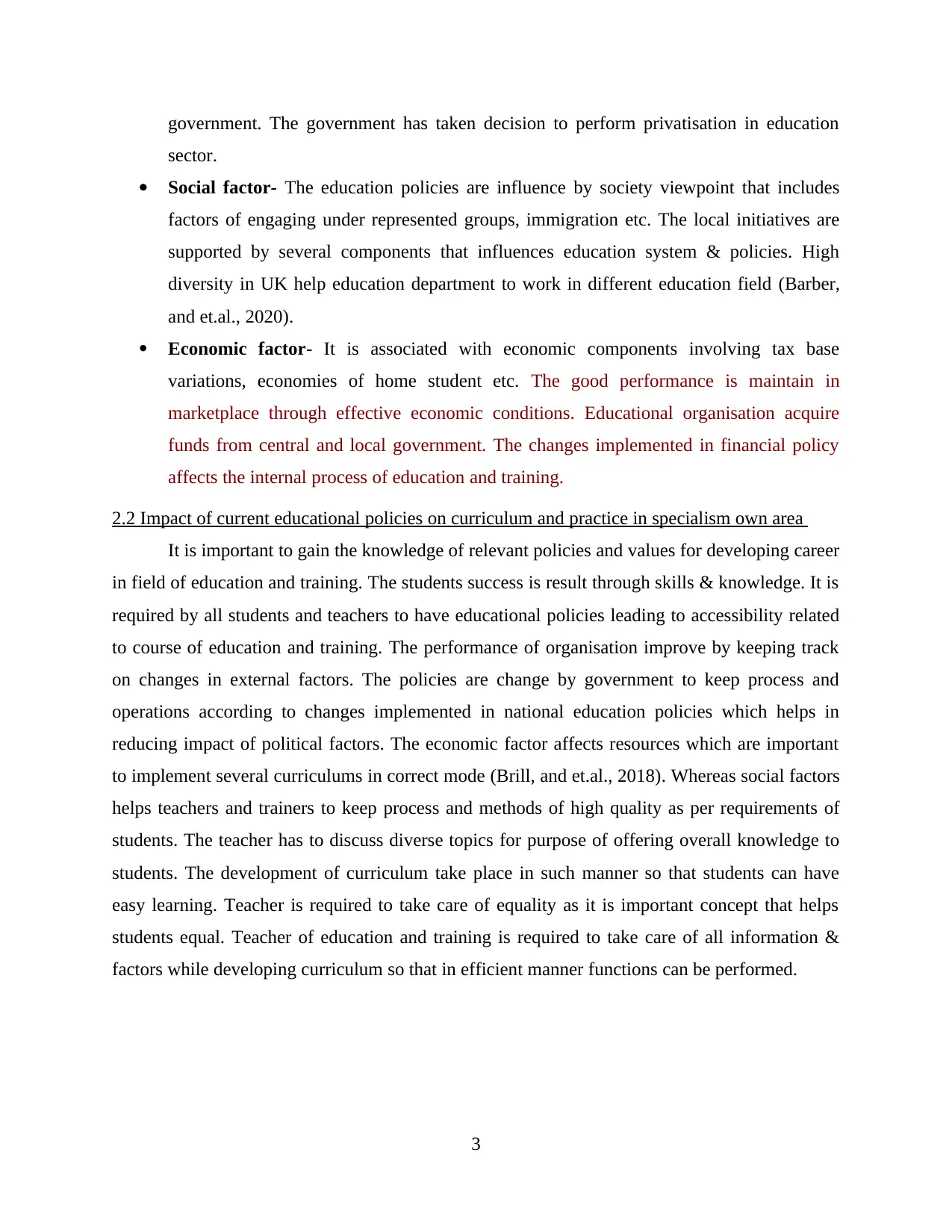
government. The government has taken decision to perform privatisation in education
sector.
Social factor- The education policies are influence by society viewpoint that includes
factors of engaging under represented groups, immigration etc. The local initiatives are
supported by several components that influences education system & policies. High
diversity in UK help education department to work in different education field (Barber,
and et.al., 2020).
Economic factor- It is associated with economic components involving tax base
variations, economies of home student etc. The good performance is maintain in
marketplace through effective economic conditions. Educational organisation acquire
funds from central and local government. The changes implemented in financial policy
affects the internal process of education and training.
2.2 Impact of current educational policies on curriculum and practice in specialism own area
It is important to gain the knowledge of relevant policies and values for developing career
in field of education and training. The students success is result through skills & knowledge. It is
required by all students and teachers to have educational policies leading to accessibility related
to course of education and training. The performance of organisation improve by keeping track
on changes in external factors. The policies are change by government to keep process and
operations according to changes implemented in national education policies which helps in
reducing impact of political factors. The economic factor affects resources which are important
to implement several curriculums in correct mode (Brill, and et.al., 2018). Whereas social factors
helps teachers and trainers to keep process and methods of high quality as per requirements of
students. The teacher has to discuss diverse topics for purpose of offering overall knowledge to
students. The development of curriculum take place in such manner so that students can have
easy learning. Teacher is required to take care of equality as it is important concept that helps
students equal. Teacher of education and training is required to take care of all information &
factors while developing curriculum so that in efficient manner functions can be performed.
3
sector.
Social factor- The education policies are influence by society viewpoint that includes
factors of engaging under represented groups, immigration etc. The local initiatives are
supported by several components that influences education system & policies. High
diversity in UK help education department to work in different education field (Barber,
and et.al., 2020).
Economic factor- It is associated with economic components involving tax base
variations, economies of home student etc. The good performance is maintain in
marketplace through effective economic conditions. Educational organisation acquire
funds from central and local government. The changes implemented in financial policy
affects the internal process of education and training.
2.2 Impact of current educational policies on curriculum and practice in specialism own area
It is important to gain the knowledge of relevant policies and values for developing career
in field of education and training. The students success is result through skills & knowledge. It is
required by all students and teachers to have educational policies leading to accessibility related
to course of education and training. The performance of organisation improve by keeping track
on changes in external factors. The policies are change by government to keep process and
operations according to changes implemented in national education policies which helps in
reducing impact of political factors. The economic factor affects resources which are important
to implement several curriculums in correct mode (Brill, and et.al., 2018). Whereas social factors
helps teachers and trainers to keep process and methods of high quality as per requirements of
students. The teacher has to discuss diverse topics for purpose of offering overall knowledge to
students. The development of curriculum take place in such manner so that students can have
easy learning. Teacher is required to take care of equality as it is important concept that helps
students equal. Teacher of education and training is required to take care of all information &
factors while developing curriculum so that in efficient manner functions can be performed.
3
⊘ This is a preview!⊘
Do you want full access?
Subscribe today to unlock all pages.

Trusted by 1+ million students worldwide
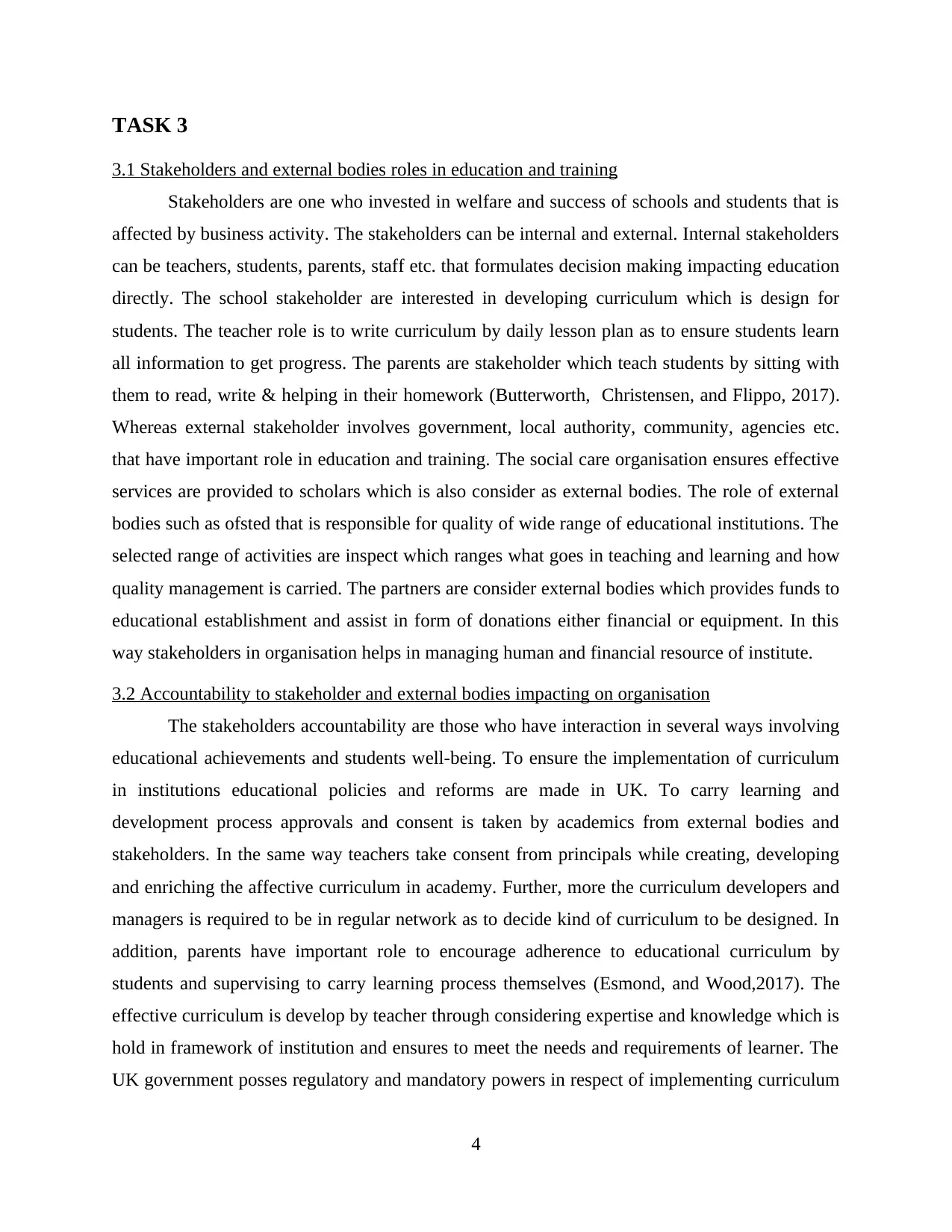
TASK 3
3.1 Stakeholders and external bodies roles in education and training
Stakeholders are one who invested in welfare and success of schools and students that is
affected by business activity. The stakeholders can be internal and external. Internal stakeholders
can be teachers, students, parents, staff etc. that formulates decision making impacting education
directly. The school stakeholder are interested in developing curriculum which is design for
students. The teacher role is to write curriculum by daily lesson plan as to ensure students learn
all information to get progress. The parents are stakeholder which teach students by sitting with
them to read, write & helping in their homework (Butterworth, Christensen, and Flippo, 2017).
Whereas external stakeholder involves government, local authority, community, agencies etc.
that have important role in education and training. The social care organisation ensures effective
services are provided to scholars which is also consider as external bodies. The role of external
bodies such as ofsted that is responsible for quality of wide range of educational institutions. The
selected range of activities are inspect which ranges what goes in teaching and learning and how
quality management is carried. The partners are consider external bodies which provides funds to
educational establishment and assist in form of donations either financial or equipment. In this
way stakeholders in organisation helps in managing human and financial resource of institute.
3.2 Accountability to stakeholder and external bodies impacting on organisation
The stakeholders accountability are those who have interaction in several ways involving
educational achievements and students well-being. To ensure the implementation of curriculum
in institutions educational policies and reforms are made in UK. To carry learning and
development process approvals and consent is taken by academics from external bodies and
stakeholders. In the same way teachers take consent from principals while creating, developing
and enriching the affective curriculum in academy. Further, more the curriculum developers and
managers is required to be in regular network as to decide kind of curriculum to be designed. In
addition, parents have important role to encourage adherence to educational curriculum by
students and supervising to carry learning process themselves (Esmond, and Wood,2017). The
effective curriculum is develop by teacher through considering expertise and knowledge which is
hold in framework of institution and ensures to meet the needs and requirements of learner. The
UK government posses regulatory and mandatory powers in respect of implementing curriculum
4
3.1 Stakeholders and external bodies roles in education and training
Stakeholders are one who invested in welfare and success of schools and students that is
affected by business activity. The stakeholders can be internal and external. Internal stakeholders
can be teachers, students, parents, staff etc. that formulates decision making impacting education
directly. The school stakeholder are interested in developing curriculum which is design for
students. The teacher role is to write curriculum by daily lesson plan as to ensure students learn
all information to get progress. The parents are stakeholder which teach students by sitting with
them to read, write & helping in their homework (Butterworth, Christensen, and Flippo, 2017).
Whereas external stakeholder involves government, local authority, community, agencies etc.
that have important role in education and training. The social care organisation ensures effective
services are provided to scholars which is also consider as external bodies. The role of external
bodies such as ofsted that is responsible for quality of wide range of educational institutions. The
selected range of activities are inspect which ranges what goes in teaching and learning and how
quality management is carried. The partners are consider external bodies which provides funds to
educational establishment and assist in form of donations either financial or equipment. In this
way stakeholders in organisation helps in managing human and financial resource of institute.
3.2 Accountability to stakeholder and external bodies impacting on organisation
The stakeholders accountability are those who have interaction in several ways involving
educational achievements and students well-being. To ensure the implementation of curriculum
in institutions educational policies and reforms are made in UK. To carry learning and
development process approvals and consent is taken by academics from external bodies and
stakeholders. In the same way teachers take consent from principals while creating, developing
and enriching the affective curriculum in academy. Further, more the curriculum developers and
managers is required to be in regular network as to decide kind of curriculum to be designed. In
addition, parents have important role to encourage adherence to educational curriculum by
students and supervising to carry learning process themselves (Esmond, and Wood,2017). The
effective curriculum is develop by teacher through considering expertise and knowledge which is
hold in framework of institution and ensures to meet the needs and requirements of learner. The
UK government posses regulatory and mandatory powers in respect of implementing curriculum
4
Paraphrase This Document
Need a fresh take? Get an instant paraphrase of this document with our AI Paraphraser
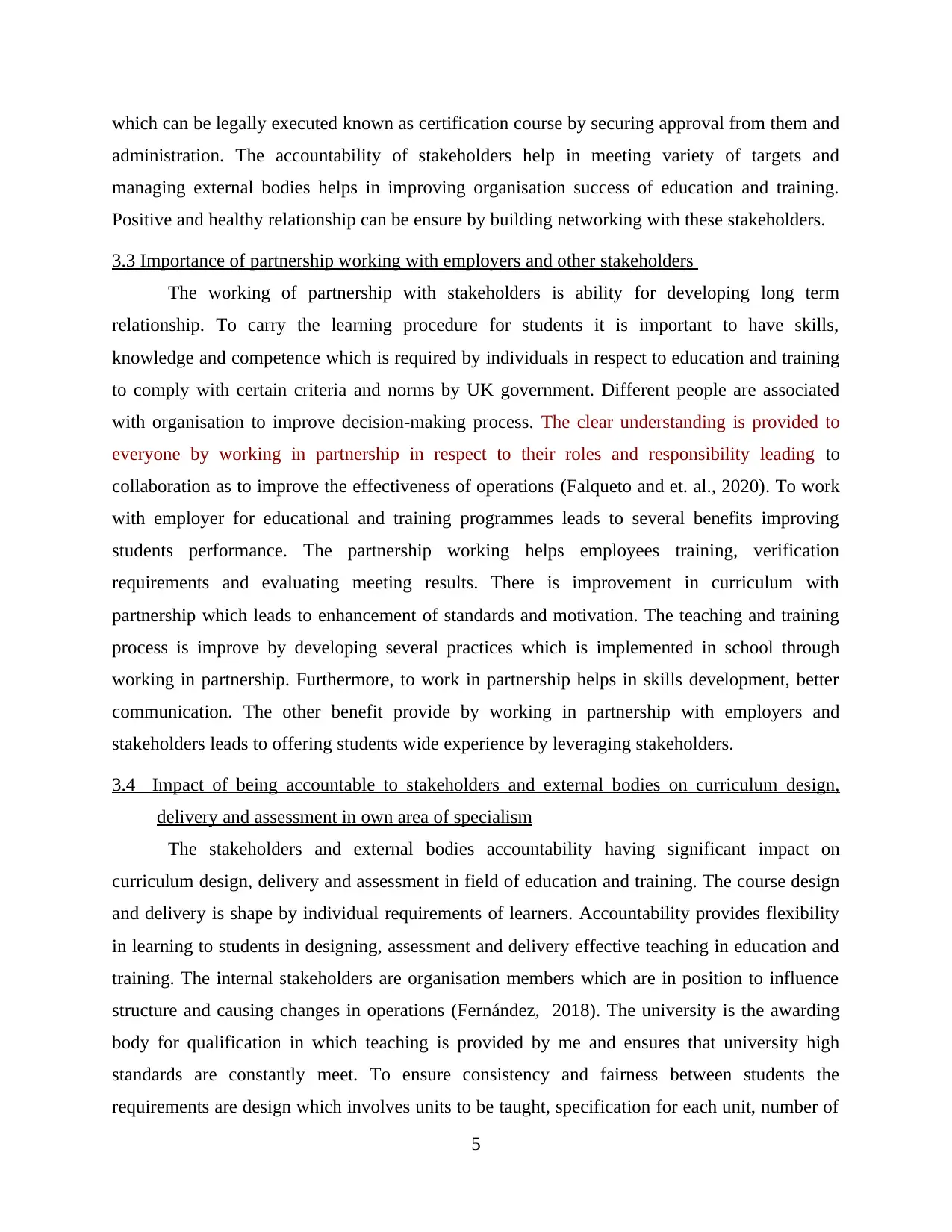
which can be legally executed known as certification course by securing approval from them and
administration. The accountability of stakeholders help in meeting variety of targets and
managing external bodies helps in improving organisation success of education and training.
Positive and healthy relationship can be ensure by building networking with these stakeholders.
3.3 Importance of partnership working with employers and other stakeholders
The working of partnership with stakeholders is ability for developing long term
relationship. To carry the learning procedure for students it is important to have skills,
knowledge and competence which is required by individuals in respect to education and training
to comply with certain criteria and norms by UK government. Different people are associated
with organisation to improve decision-making process. The clear understanding is provided to
everyone by working in partnership in respect to their roles and responsibility leading to
collaboration as to improve the effectiveness of operations (Falqueto and et. al., 2020). To work
with employer for educational and training programmes leads to several benefits improving
students performance. The partnership working helps employees training, verification
requirements and evaluating meeting results. There is improvement in curriculum with
partnership which leads to enhancement of standards and motivation. The teaching and training
process is improve by developing several practices which is implemented in school through
working in partnership. Furthermore, to work in partnership helps in skills development, better
communication. The other benefit provide by working in partnership with employers and
stakeholders leads to offering students wide experience by leveraging stakeholders.
3.4 Impact of being accountable to stakeholders and external bodies on curriculum design,
delivery and assessment in own area of specialism
The stakeholders and external bodies accountability having significant impact on
curriculum design, delivery and assessment in field of education and training. The course design
and delivery is shape by individual requirements of learners. Accountability provides flexibility
in learning to students in designing, assessment and delivery effective teaching in education and
training. The internal stakeholders are organisation members which are in position to influence
structure and causing changes in operations (Fernández, 2018). The university is the awarding
body for qualification in which teaching is provided by me and ensures that university high
standards are constantly meet. To ensure consistency and fairness between students the
requirements are design which involves units to be taught, specification for each unit, number of
5
administration. The accountability of stakeholders help in meeting variety of targets and
managing external bodies helps in improving organisation success of education and training.
Positive and healthy relationship can be ensure by building networking with these stakeholders.
3.3 Importance of partnership working with employers and other stakeholders
The working of partnership with stakeholders is ability for developing long term
relationship. To carry the learning procedure for students it is important to have skills,
knowledge and competence which is required by individuals in respect to education and training
to comply with certain criteria and norms by UK government. Different people are associated
with organisation to improve decision-making process. The clear understanding is provided to
everyone by working in partnership in respect to their roles and responsibility leading to
collaboration as to improve the effectiveness of operations (Falqueto and et. al., 2020). To work
with employer for educational and training programmes leads to several benefits improving
students performance. The partnership working helps employees training, verification
requirements and evaluating meeting results. There is improvement in curriculum with
partnership which leads to enhancement of standards and motivation. The teaching and training
process is improve by developing several practices which is implemented in school through
working in partnership. Furthermore, to work in partnership helps in skills development, better
communication. The other benefit provide by working in partnership with employers and
stakeholders leads to offering students wide experience by leveraging stakeholders.
3.4 Impact of being accountable to stakeholders and external bodies on curriculum design,
delivery and assessment in own area of specialism
The stakeholders and external bodies accountability having significant impact on
curriculum design, delivery and assessment in field of education and training. The course design
and delivery is shape by individual requirements of learners. Accountability provides flexibility
in learning to students in designing, assessment and delivery effective teaching in education and
training. The internal stakeholders are organisation members which are in position to influence
structure and causing changes in operations (Fernández, 2018). The university is the awarding
body for qualification in which teaching is provided by me and ensures that university high
standards are constantly meet. To ensure consistency and fairness between students the
requirements are design which involves units to be taught, specification for each unit, number of
5
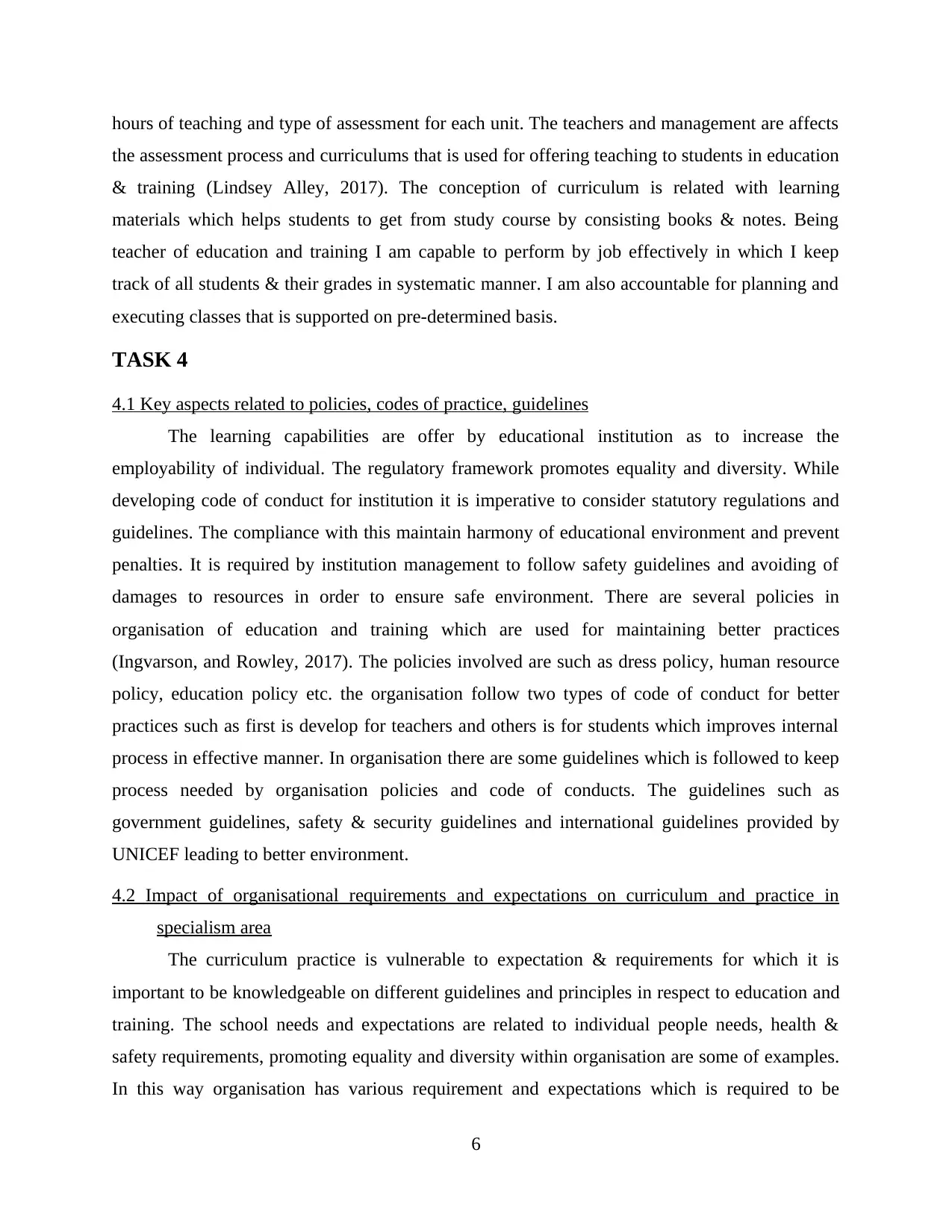
hours of teaching and type of assessment for each unit. The teachers and management are affects
the assessment process and curriculums that is used for offering teaching to students in education
& training (Lindsey Alley, 2017). The conception of curriculum is related with learning
materials which helps students to get from study course by consisting books & notes. Being
teacher of education and training I am capable to perform by job effectively in which I keep
track of all students & their grades in systematic manner. I am also accountable for planning and
executing classes that is supported on pre-determined basis.
TASK 4
4.1 Key aspects related to policies, codes of practice, guidelines
The learning capabilities are offer by educational institution as to increase the
employability of individual. The regulatory framework promotes equality and diversity. While
developing code of conduct for institution it is imperative to consider statutory regulations and
guidelines. The compliance with this maintain harmony of educational environment and prevent
penalties. It is required by institution management to follow safety guidelines and avoiding of
damages to resources in order to ensure safe environment. There are several policies in
organisation of education and training which are used for maintaining better practices
(Ingvarson, and Rowley, 2017). The policies involved are such as dress policy, human resource
policy, education policy etc. the organisation follow two types of code of conduct for better
practices such as first is develop for teachers and others is for students which improves internal
process in effective manner. In organisation there are some guidelines which is followed to keep
process needed by organisation policies and code of conducts. The guidelines such as
government guidelines, safety & security guidelines and international guidelines provided by
UNICEF leading to better environment.
4.2 Impact of organisational requirements and expectations on curriculum and practice in
specialism area
The curriculum practice is vulnerable to expectation & requirements for which it is
important to be knowledgeable on different guidelines and principles in respect to education and
training. The school needs and expectations are related to individual people needs, health &
safety requirements, promoting equality and diversity within organisation are some of examples.
In this way organisation has various requirement and expectations which is required to be
6
the assessment process and curriculums that is used for offering teaching to students in education
& training (Lindsey Alley, 2017). The conception of curriculum is related with learning
materials which helps students to get from study course by consisting books & notes. Being
teacher of education and training I am capable to perform by job effectively in which I keep
track of all students & their grades in systematic manner. I am also accountable for planning and
executing classes that is supported on pre-determined basis.
TASK 4
4.1 Key aspects related to policies, codes of practice, guidelines
The learning capabilities are offer by educational institution as to increase the
employability of individual. The regulatory framework promotes equality and diversity. While
developing code of conduct for institution it is imperative to consider statutory regulations and
guidelines. The compliance with this maintain harmony of educational environment and prevent
penalties. It is required by institution management to follow safety guidelines and avoiding of
damages to resources in order to ensure safe environment. There are several policies in
organisation of education and training which are used for maintaining better practices
(Ingvarson, and Rowley, 2017). The policies involved are such as dress policy, human resource
policy, education policy etc. the organisation follow two types of code of conduct for better
practices such as first is develop for teachers and others is for students which improves internal
process in effective manner. In organisation there are some guidelines which is followed to keep
process needed by organisation policies and code of conducts. The guidelines such as
government guidelines, safety & security guidelines and international guidelines provided by
UNICEF leading to better environment.
4.2 Impact of organisational requirements and expectations on curriculum and practice in
specialism area
The curriculum practice is vulnerable to expectation & requirements for which it is
important to be knowledgeable on different guidelines and principles in respect to education and
training. The school needs and expectations are related to individual people needs, health &
safety requirements, promoting equality and diversity within organisation are some of examples.
In this way organisation has various requirement and expectations which is required to be
6
⊘ This is a preview!⊘
Do you want full access?
Subscribe today to unlock all pages.

Trusted by 1+ million students worldwide
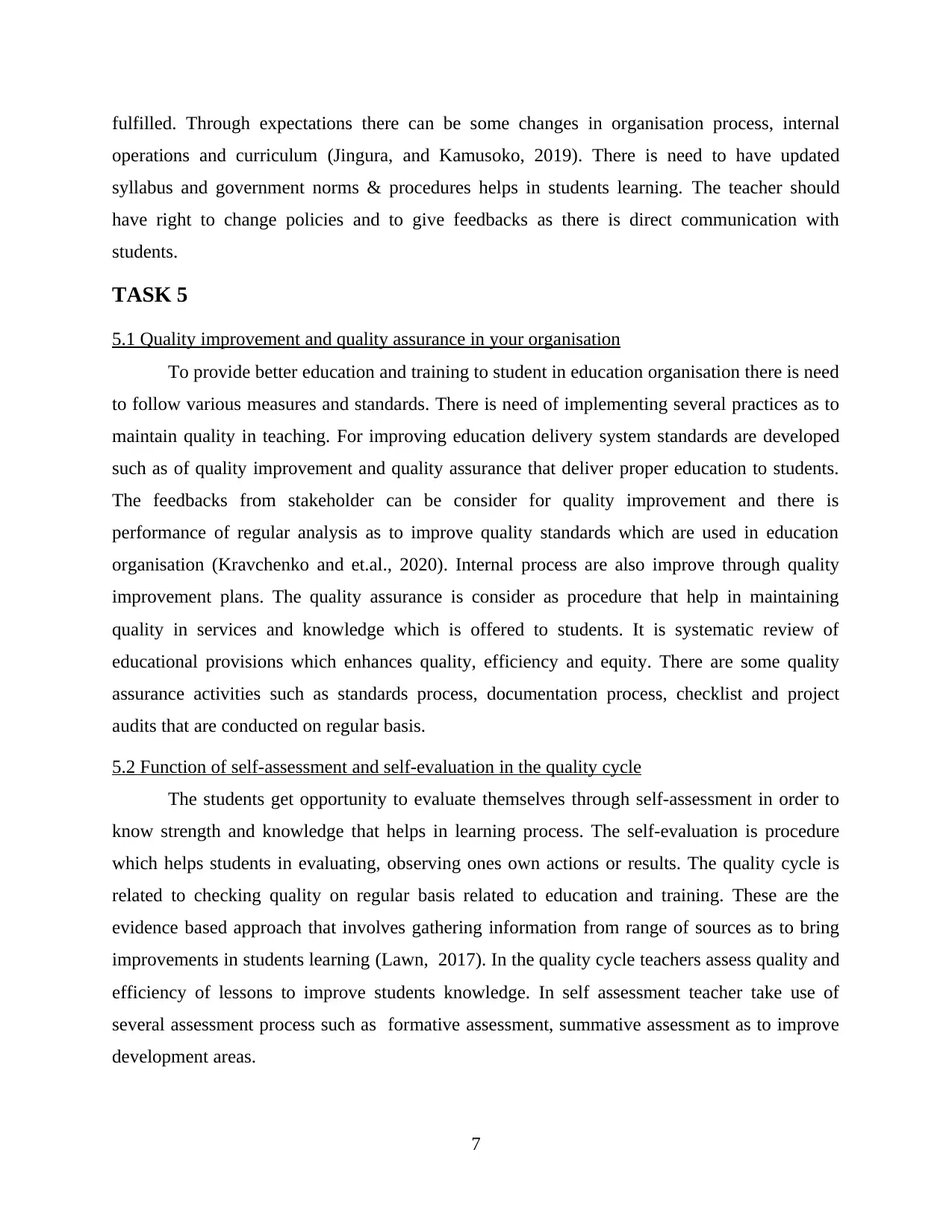
fulfilled. Through expectations there can be some changes in organisation process, internal
operations and curriculum (Jingura, and Kamusoko, 2019). There is need to have updated
syllabus and government norms & procedures helps in students learning. The teacher should
have right to change policies and to give feedbacks as there is direct communication with
students.
TASK 5
5.1 Quality improvement and quality assurance in your organisation
To provide better education and training to student in education organisation there is need
to follow various measures and standards. There is need of implementing several practices as to
maintain quality in teaching. For improving education delivery system standards are developed
such as of quality improvement and quality assurance that deliver proper education to students.
The feedbacks from stakeholder can be consider for quality improvement and there is
performance of regular analysis as to improve quality standards which are used in education
organisation (Kravchenko and et.al., 2020). Internal process are also improve through quality
improvement plans. The quality assurance is consider as procedure that help in maintaining
quality in services and knowledge which is offered to students. It is systematic review of
educational provisions which enhances quality, efficiency and equity. There are some quality
assurance activities such as standards process, documentation process, checklist and project
audits that are conducted on regular basis.
5.2 Function of self-assessment and self-evaluation in the quality cycle
The students get opportunity to evaluate themselves through self-assessment in order to
know strength and knowledge that helps in learning process. The self-evaluation is procedure
which helps students in evaluating, observing ones own actions or results. The quality cycle is
related to checking quality on regular basis related to education and training. These are the
evidence based approach that involves gathering information from range of sources as to bring
improvements in students learning (Lawn, 2017). In the quality cycle teachers assess quality and
efficiency of lessons to improve students knowledge. In self assessment teacher take use of
several assessment process such as formative assessment, summative assessment as to improve
development areas.
7
operations and curriculum (Jingura, and Kamusoko, 2019). There is need to have updated
syllabus and government norms & procedures helps in students learning. The teacher should
have right to change policies and to give feedbacks as there is direct communication with
students.
TASK 5
5.1 Quality improvement and quality assurance in your organisation
To provide better education and training to student in education organisation there is need
to follow various measures and standards. There is need of implementing several practices as to
maintain quality in teaching. For improving education delivery system standards are developed
such as of quality improvement and quality assurance that deliver proper education to students.
The feedbacks from stakeholder can be consider for quality improvement and there is
performance of regular analysis as to improve quality standards which are used in education
organisation (Kravchenko and et.al., 2020). Internal process are also improve through quality
improvement plans. The quality assurance is consider as procedure that help in maintaining
quality in services and knowledge which is offered to students. It is systematic review of
educational provisions which enhances quality, efficiency and equity. There are some quality
assurance activities such as standards process, documentation process, checklist and project
audits that are conducted on regular basis.
5.2 Function of self-assessment and self-evaluation in the quality cycle
The students get opportunity to evaluate themselves through self-assessment in order to
know strength and knowledge that helps in learning process. The self-evaluation is procedure
which helps students in evaluating, observing ones own actions or results. The quality cycle is
related to checking quality on regular basis related to education and training. These are the
evidence based approach that involves gathering information from range of sources as to bring
improvements in students learning (Lawn, 2017). In the quality cycle teachers assess quality and
efficiency of lessons to improve students knowledge. In self assessment teacher take use of
several assessment process such as formative assessment, summative assessment as to improve
development areas.
7
Paraphrase This Document
Need a fresh take? Get an instant paraphrase of this document with our AI Paraphraser
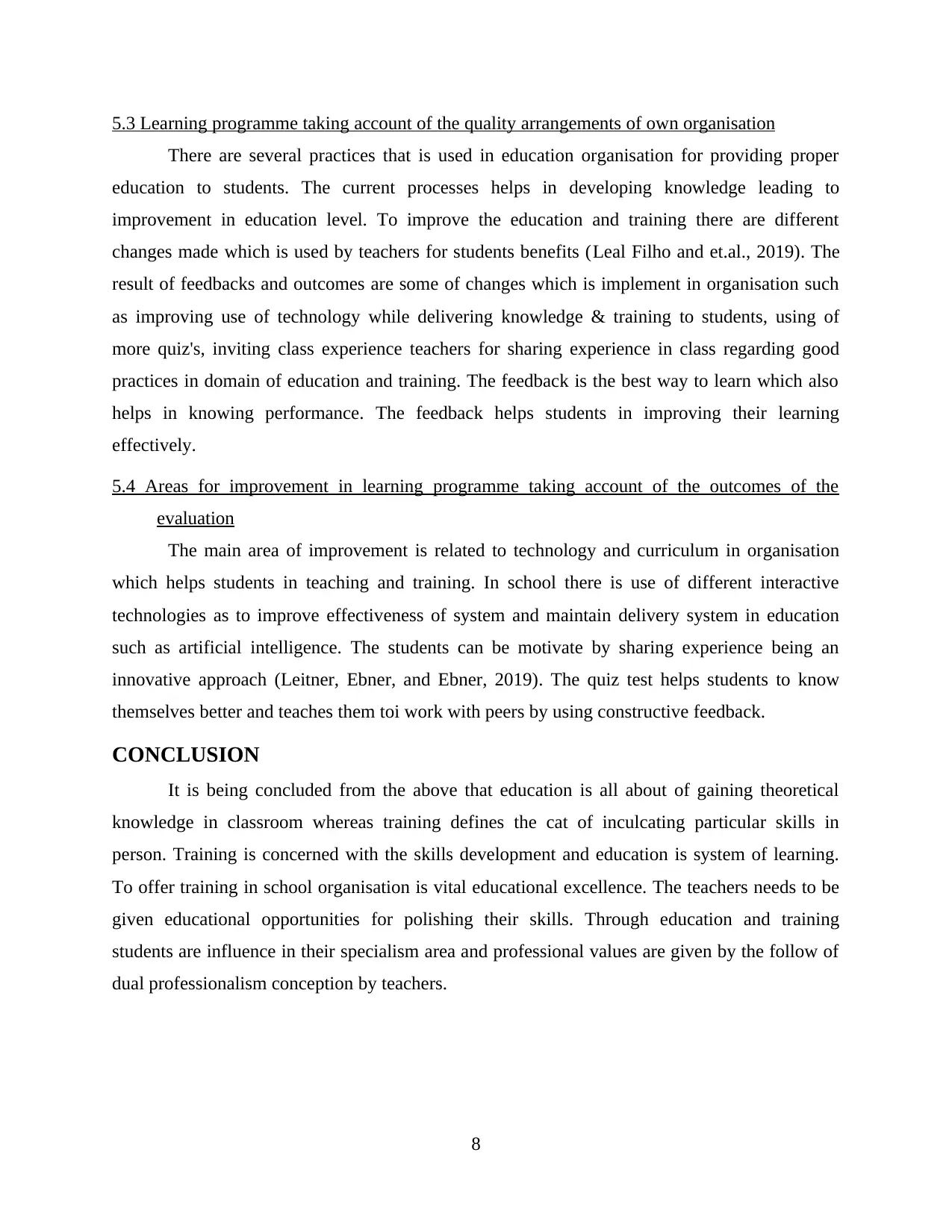
5.3 Learning programme taking account of the quality arrangements of own organisation
There are several practices that is used in education organisation for providing proper
education to students. The current processes helps in developing knowledge leading to
improvement in education level. To improve the education and training there are different
changes made which is used by teachers for students benefits (Leal Filho and et.al., 2019). The
result of feedbacks and outcomes are some of changes which is implement in organisation such
as improving use of technology while delivering knowledge & training to students, using of
more quiz's, inviting class experience teachers for sharing experience in class regarding good
practices in domain of education and training. The feedback is the best way to learn which also
helps in knowing performance. The feedback helps students in improving their learning
effectively.
5.4 Areas for improvement in learning programme taking account of the outcomes of the
evaluation
The main area of improvement is related to technology and curriculum in organisation
which helps students in teaching and training. In school there is use of different interactive
technologies as to improve effectiveness of system and maintain delivery system in education
such as artificial intelligence. The students can be motivate by sharing experience being an
innovative approach (Leitner, Ebner, and Ebner, 2019). The quiz test helps students to know
themselves better and teaches them toi work with peers by using constructive feedback.
CONCLUSION
It is being concluded from the above that education is all about of gaining theoretical
knowledge in classroom whereas training defines the cat of inculcating particular skills in
person. Training is concerned with the skills development and education is system of learning.
To offer training in school organisation is vital educational excellence. The teachers needs to be
given educational opportunities for polishing their skills. Through education and training
students are influence in their specialism area and professional values are given by the follow of
dual professionalism conception by teachers.
8
There are several practices that is used in education organisation for providing proper
education to students. The current processes helps in developing knowledge leading to
improvement in education level. To improve the education and training there are different
changes made which is used by teachers for students benefits (Leal Filho and et.al., 2019). The
result of feedbacks and outcomes are some of changes which is implement in organisation such
as improving use of technology while delivering knowledge & training to students, using of
more quiz's, inviting class experience teachers for sharing experience in class regarding good
practices in domain of education and training. The feedback is the best way to learn which also
helps in knowing performance. The feedback helps students in improving their learning
effectively.
5.4 Areas for improvement in learning programme taking account of the outcomes of the
evaluation
The main area of improvement is related to technology and curriculum in organisation
which helps students in teaching and training. In school there is use of different interactive
technologies as to improve effectiveness of system and maintain delivery system in education
such as artificial intelligence. The students can be motivate by sharing experience being an
innovative approach (Leitner, Ebner, and Ebner, 2019). The quiz test helps students to know
themselves better and teaches them toi work with peers by using constructive feedback.
CONCLUSION
It is being concluded from the above that education is all about of gaining theoretical
knowledge in classroom whereas training defines the cat of inculcating particular skills in
person. Training is concerned with the skills development and education is system of learning.
To offer training in school organisation is vital educational excellence. The teachers needs to be
given educational opportunities for polishing their skills. Through education and training
students are influence in their specialism area and professional values are given by the follow of
dual professionalism conception by teachers.
8
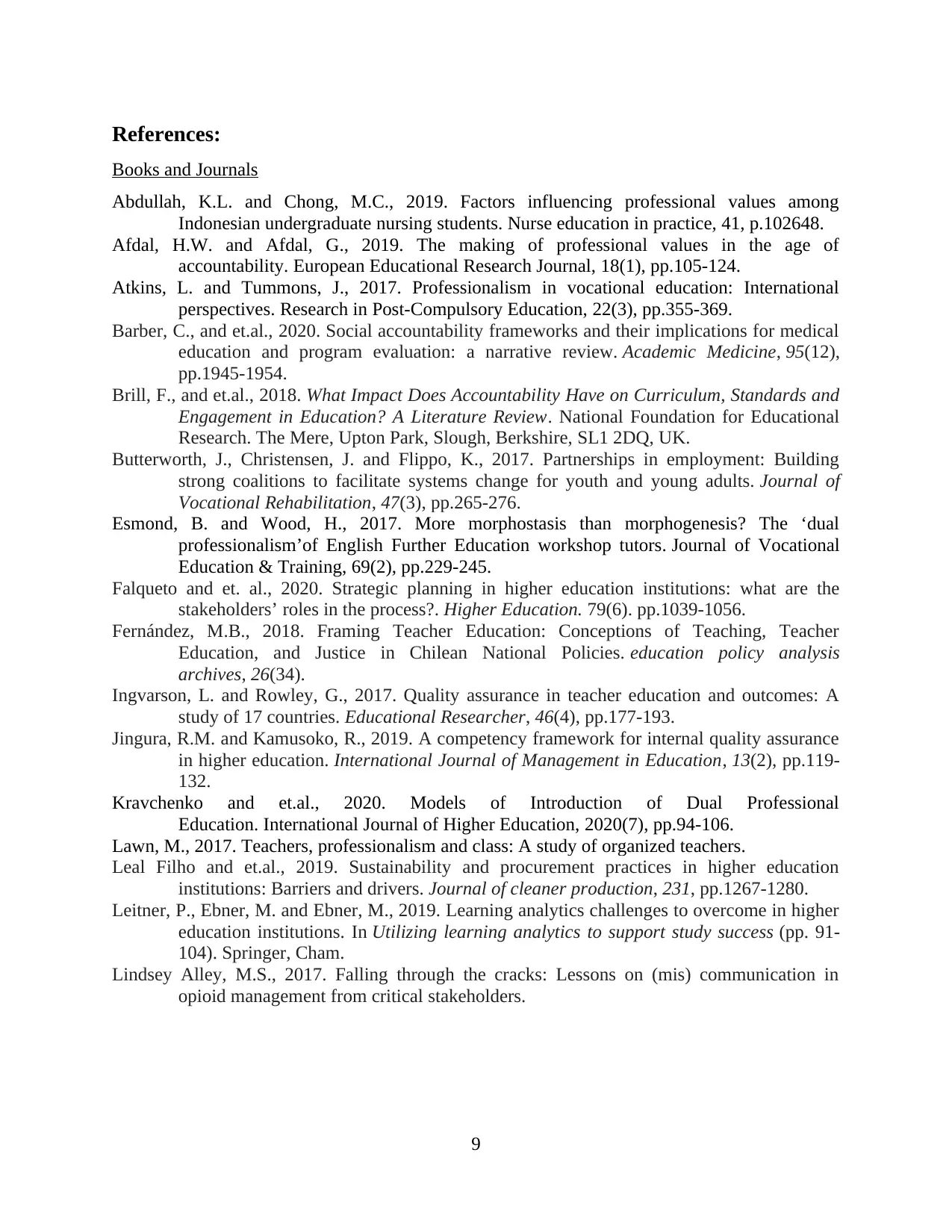
References:
Books and Journals
Abdullah, K.L. and Chong, M.C., 2019. Factors influencing professional values among
Indonesian undergraduate nursing students. Nurse education in practice, 41, p.102648.
Afdal, H.W. and Afdal, G., 2019. The making of professional values in the age of
accountability. European Educational Research Journal, 18(1), pp.105-124.
Atkins, L. and Tummons, J., 2017. Professionalism in vocational education: International
perspectives. Research in Post-Compulsory Education, 22(3), pp.355-369.
Barber, C., and et.al., 2020. Social accountability frameworks and their implications for medical
education and program evaluation: a narrative review. Academic Medicine, 95(12),
pp.1945-1954.
Brill, F., and et.al., 2018. What Impact Does Accountability Have on Curriculum, Standards and
Engagement in Education? A Literature Review. National Foundation for Educational
Research. The Mere, Upton Park, Slough, Berkshire, SL1 2DQ, UK.
Butterworth, J., Christensen, J. and Flippo, K., 2017. Partnerships in employment: Building
strong coalitions to facilitate systems change for youth and young adults. Journal of
Vocational Rehabilitation, 47(3), pp.265-276.
Esmond, B. and Wood, H., 2017. More morphostasis than morphogenesis? The ‘dual
professionalism’of English Further Education workshop tutors. Journal of Vocational
Education & Training, 69(2), pp.229-245.
Falqueto and et. al., 2020. Strategic planning in higher education institutions: what are the
stakeholders’ roles in the process?. Higher Education. 79(6). pp.1039-1056.
Fernández, M.B., 2018. Framing Teacher Education: Conceptions of Teaching, Teacher
Education, and Justice in Chilean National Policies. education policy analysis
archives, 26(34).
Ingvarson, L. and Rowley, G., 2017. Quality assurance in teacher education and outcomes: A
study of 17 countries. Educational Researcher, 46(4), pp.177-193.
Jingura, R.M. and Kamusoko, R., 2019. A competency framework for internal quality assurance
in higher education. International Journal of Management in Education, 13(2), pp.119-
132.
Kravchenko and et.al., 2020. Models of Introduction of Dual Professional
Education. International Journal of Higher Education, 2020(7), pp.94-106.
Lawn, M., 2017. Teachers, professionalism and class: A study of organized teachers.
Leal Filho and et.al., 2019. Sustainability and procurement practices in higher education
institutions: Barriers and drivers. Journal of cleaner production, 231, pp.1267-1280.
Leitner, P., Ebner, M. and Ebner, M., 2019. Learning analytics challenges to overcome in higher
education institutions. In Utilizing learning analytics to support study success (pp. 91-
104). Springer, Cham.
Lindsey Alley, M.S., 2017. Falling through the cracks: Lessons on (mis) communication in
opioid management from critical stakeholders.
9
Books and Journals
Abdullah, K.L. and Chong, M.C., 2019. Factors influencing professional values among
Indonesian undergraduate nursing students. Nurse education in practice, 41, p.102648.
Afdal, H.W. and Afdal, G., 2019. The making of professional values in the age of
accountability. European Educational Research Journal, 18(1), pp.105-124.
Atkins, L. and Tummons, J., 2017. Professionalism in vocational education: International
perspectives. Research in Post-Compulsory Education, 22(3), pp.355-369.
Barber, C., and et.al., 2020. Social accountability frameworks and their implications for medical
education and program evaluation: a narrative review. Academic Medicine, 95(12),
pp.1945-1954.
Brill, F., and et.al., 2018. What Impact Does Accountability Have on Curriculum, Standards and
Engagement in Education? A Literature Review. National Foundation for Educational
Research. The Mere, Upton Park, Slough, Berkshire, SL1 2DQ, UK.
Butterworth, J., Christensen, J. and Flippo, K., 2017. Partnerships in employment: Building
strong coalitions to facilitate systems change for youth and young adults. Journal of
Vocational Rehabilitation, 47(3), pp.265-276.
Esmond, B. and Wood, H., 2017. More morphostasis than morphogenesis? The ‘dual
professionalism’of English Further Education workshop tutors. Journal of Vocational
Education & Training, 69(2), pp.229-245.
Falqueto and et. al., 2020. Strategic planning in higher education institutions: what are the
stakeholders’ roles in the process?. Higher Education. 79(6). pp.1039-1056.
Fernández, M.B., 2018. Framing Teacher Education: Conceptions of Teaching, Teacher
Education, and Justice in Chilean National Policies. education policy analysis
archives, 26(34).
Ingvarson, L. and Rowley, G., 2017. Quality assurance in teacher education and outcomes: A
study of 17 countries. Educational Researcher, 46(4), pp.177-193.
Jingura, R.M. and Kamusoko, R., 2019. A competency framework for internal quality assurance
in higher education. International Journal of Management in Education, 13(2), pp.119-
132.
Kravchenko and et.al., 2020. Models of Introduction of Dual Professional
Education. International Journal of Higher Education, 2020(7), pp.94-106.
Lawn, M., 2017. Teachers, professionalism and class: A study of organized teachers.
Leal Filho and et.al., 2019. Sustainability and procurement practices in higher education
institutions: Barriers and drivers. Journal of cleaner production, 231, pp.1267-1280.
Leitner, P., Ebner, M. and Ebner, M., 2019. Learning analytics challenges to overcome in higher
education institutions. In Utilizing learning analytics to support study success (pp. 91-
104). Springer, Cham.
Lindsey Alley, M.S., 2017. Falling through the cracks: Lessons on (mis) communication in
opioid management from critical stakeholders.
9
⊘ This is a preview!⊘
Do you want full access?
Subscribe today to unlock all pages.

Trusted by 1+ million students worldwide
1 out of 13
Related Documents
Your All-in-One AI-Powered Toolkit for Academic Success.
+13062052269
info@desklib.com
Available 24*7 on WhatsApp / Email
![[object Object]](/_next/static/media/star-bottom.7253800d.svg)
Unlock your academic potential
Copyright © 2020–2026 A2Z Services. All Rights Reserved. Developed and managed by ZUCOL.
